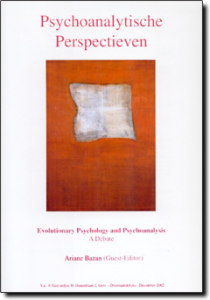Vol 20 (4) 2002
The evolution of the unconscious – David Smith
The Freudian Unconscious? A subversion of evolution as adaptation – Veroniek Knockaert
Evolutionary and psychoanalytic explanations: how to bridge the gap? Comments on “The evolution of the unconscious” by David Smith – Gertrudis Van de Vijver
The unconscious as affect sticking to phonology. Considerations on the role of articulation – Ariane Bazan
Unconscious communication and the resistance of the psychoanalyst – Filip Geerardyn
Evolutionary Psychology and Psychoanalysis. On the Nature of the Unconscious – David Van Bunder
Neglect and anosognosia. A challenge for psychoanalysis. Psychoanalytic treatment of neurological patients with hemi-neglect – Klaus Röckerath
Naturalizing Husserlian Phenomenology: an Introduction – Helena De Preester
Naturalizing Husserlian Phenomenology: an Introduction
This article gives an introductory account of what a "naturalization" of (Husserlian) phenomenology would involve. The first part deals with Husserlian phenomenology and Husserl's view on psychology and epistemology. The second part introduces the cognitive sciences...
Neglect and anosognosia. A challenge for psychoanalysis. Psychoanalytic treatment of neurological patients with hemi-neglect
Neglect and anosognosia, i.e., the denial of the (left) hemisphere and the denial of hemiplegia, are often found in patients suffering from damage to the right hemisphere of the brain. It has been known for some time that these symptoms can be alleviated, albeit...
Evolutionary Psychology and Psychoanalysis. On the Nature of the Unconscious
One way in which the dynamic unconscious is justified is by taking into account the evolution and development of the psychical apparatus. It could be argued that evolutionary psychology is the right way to approach this issue. We contend however that the focus on...
Unconscious communication and the resistance of the psychoanalyst
As a comment on Smith's paper, "The Evolution of the Unconscious" (2002), the question of the nature of so-called unconscious communication is addressed. Some passages in Freud's writings appear to suggest that this phenomenon can be explained by the transmission of...
The unconscious as affect sticking to phonology. Considerations on the role of articulation
In this article a solid neurodynamic framework is proposed for the Freudian-Lacanian linguistically structured unconscious in terms of "affect sticking to phonology", as well as for the particular importance of articulation in the processing of affect. First, the idea...
Evolutionary and psychoanalytic explanations: how to bridge the gap? Comments on “The evolution of the unconscious” by David Smith
Interdisciplinary approaches are useful because they help to clarify and overcome the blind spots inescapable in any scientific theory. Combining psychoanalytic and evolutionary accounts of the human psychic system can therefore have interesting outcomes. It is...
The Freudian Unconscious? A subversion of evolution as adaptation
Smith (2002), in "The evolution of the unconscious", states that the Freudian unconscious consists of evolved psychological or biological propensities. In this paper, the author analyses Smith's statement through a critical discussion of the neo-Darwinian conception...
The evolution of the unconscious
Psychoanalysis is reconceptualized as the scientific study of conflicting biological propensities. According to neo-Darwinian theory self-deception arose as a result of an evolutionary arms race between intraspecific deception and detection amongst hominids. The...
